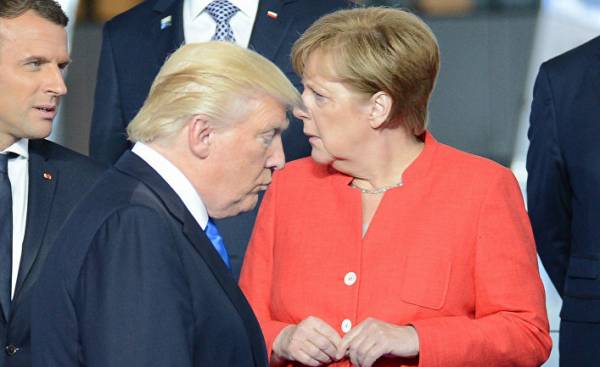
German Chancellor Angela Merkel joined the criticism of the tightening of us sanctions against Russia, which was another evidence of the growing political differences between Berlin and Washington.
Normally cautious and restrained Ms. Merkel supported the Minister for foreign Affairs of Germany Sigmar Gabriel (Sigmar Gabriel), who made sharp criticism of the proposals of the United States. According to her representative, she sounded “the same degree of concern” with “the same vehemence”.
The intervention of Ms. Merkel demonstrates her willingness to publicly voice criticism of the U.S. open after the attacks the US President Donald trump on Germany for its policy in the sphere of defence, trade and international cooperation.
Ms. Merkel has demonstrated its willingness to provoke a negative reaction, Mr. trump and his allies, although she claims that she is a strong supporter of preserving the transatlantic Alliance because, in its opinion, at stake are the interests of Germany and Europe.
The prospect of friction in relations between the US and Germany may overshadow the summit Big twenty, which will be held in July in Hamburg, obviously, no longer holding back the German Chancellor, the most influential politician in Europe.
Criticism of Ms. Merkel was directed against the Senate, which decided to toughen sanctions against Russia, introduced in connection with the aggression of the Kremlin in Ukraine, deployment of nuclear weapons and the alleged involvement of Russia in the American presidential election. This bill, which is expected to be approved by the House of representatives codifies existing sanctions that will significantly complicate the process of mitigation. The decision of the Senate is largely due to the concern that was widely discussed earlier this year that Mr. trump can take too soft attitude towards Russia.
However, this bill introduces new measures including against caused a lot of controversy of the project “Northern stream-2”, in which German and Austrian companies have already invested their money. In addition to the sanctions against Russian companies, the bill stipulates sanctions against foreign companies that support “Russian export pipelines.”
Berlin condemned the measures, calling them interference in the internal Affairs of Europe and the threat “to European companies involved in the development of the European energy supplies”.
Germany is outraged that the bill expands the list of justifications for the imposition and tightening of sanctions beyond the Russian aggression in Ukraine, which was the original reason for the joint U.S. sanctions and the European Union, prepared by Ms. Merkel and the predecessor of Mr. trump’s Barack Obama. Although Berlin shares the concern of the Americans that Russia may intervene in the course of American elections, she wants the future of sanctions imposed in connection with Russia’s actions in Ukraine, was directly related to changes in the situation in Ukraine to President of Russia Vladimir Putin was interested in resolving the crisis.
German officials are also extremely unhappy that this bill forces the U.S. administration to “give priority” to U.S. energy exports, “to create jobs in the United States” and “strengthen” US foreign policy. According to German officials, this is contrary to the essence of the current sanctions regime, based on cooperation, because America has put its economic interests above the interests of its European allies, in particular in the energy sector.
It is worth noting that earlier Berlin has rejected the proposal of the Secretary of state, USA Rex Tillerson (Rex Tillerson) about how to give Moscow an opportunity to resolve the current Ukrainian crisis, beyond the framework of the Minsk agreement, the unfulfilled peace agreement signed in 2015 with the support of Russia, Ukraine, France and Germany in the so-called Normandy format. According to German officials, Ms. Merkel remains a strong supporter of the Minsk agreements and the Normandy format.
The fact that Mrs. Merkel supported Mr. Gabriel in his criticism of the United States, does not imply softening her skepticism about the project “Nord stream-2” as such. Although Mr. Gabriel vigorously defends the project, arguing the economic motives, Ms. Merkel is trying to keep a distance because of the strong objections of Poland and other Eastern European allies of Germany.







